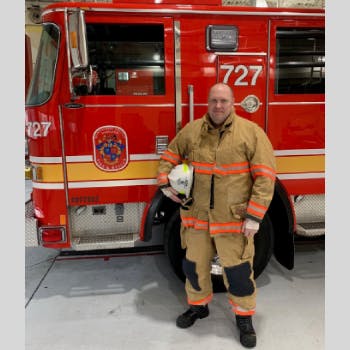Getting to become a Firefighter was a dream job, and the beginning of my career was exciting for me. My body was young and healthy, and everything was new. I lucked out with my first station assignment. The men and women on the shift were older, well-seasoned, and definitely knew how to do their jobs. They made me feel safe, and they let me make mistakes in controlled ways so I could learn. They were the backstop for so many of my first experiences, and in many ways, they set the tone for my entire career. This crew ran a lot of calls and did a lot of work, but it was the way they engaged people and the profession that made all the difference.
My first Captain was direct with his expectations of me on my first day. He reminded me that every person we come across was, at one time, somebody’s kid. He said a lot of things happen to people over the years, and if we are encountering them, something probably went wrong. He told me I was not here to judge any of them, only to blend in and help them. He also taught me an important reflection for serving people that I pass on to all my children at home and Firefighters at work today. The reflection goes, “Imagine you rewound time and you were placed in a patient’s life, owning all of their experiences and conditions. Would you do any better than they did?” Twenty years later, I can do any job in this Fire Department, and that reflection is still the most important thing I have learned.
Being a Firefighter was the sole purpose of my life, and then I got married and now have three children. Raising children with my wife is the best project I have ever been involved with and doing it in a community with lifelong Fire Service brothers and sisters in the picture is a blessing. Everything was going great in my family’s world. My wife and I were happy, the kids were healthy, and from a career perspective, I had been promoted to Lieutenant and was taking on great new responsibilities. I was getting to live the life I hoped for. I was a protector in the community, a provider and nurturer at home, and everything was good. That all changed one Sunday afternoon when I became paralyzed. The morning started normally, but by the end of the day, I was a quadriplegic in intensive care. After all the dangers I had escaped on the job, I ended up being taken out by an acute neurologic disease called Guillian Barre Syndrome.
In a matter of hours, I went from a healthy and fit Fire Rescue Lieutenant who took care of other people to be completely vulnerable and medically cared for by First Responders. I could not move anything, I could not breathe, and I was terrified. Some of the memories are a blur, but people came into my life, got me to the hospital, and my friends stepped in to take care of my family. The next morning, I received my last rights, and I remember my wife bringing in my children to see me just in case things went badly.
Thankfully, my condition eventually stabilized, but not before it obliterated my entire periapical nervous system. I lived in the hospital for months. At every critical junction, someone took care of me. Nurses managed my airway, people cleaned me, and physical therapists literally picked me up and helped me learn how to walk again. All during that time, the First Responder community took care of my family at home. People took my kids on outings, they took care of my house, and people were kind to my wife. People even looked after my elderly parents for me. When I finally came home, I found that First Responders had built me a wheelchair ramp and outfitted my house so I could finish recovering at home. When I got home, First Responders came to my house, loaded me and my wheelchair into the truck, and they took me to “work” during the day so I could be around people. My recovery outlook was uncertain, but I only got positive encouragement from the First Responders. The more they took me in to work, the better I got. A year later I was walking and working out, and I passed the test to come to full duty. When I took the test, people showed up to support me. I had finally learned that I could help other people by letting them into my life to share in my own struggles.
I got back to work just in time for the COVID-19 pandemic. We adapted a lot during that time and were pulled into public health roles that we never expected to be in. I am proud of how our First Responders performed in that challenging time, and I am grateful that I was able to come back and be a part of that response. The pandemic response taught me that I need to get education and training so that I can be a force multiplier to take care of people and influence responses and systems on a larger scale.
The First Responder Community shaped the first part of my life and gave me a mission and purpose. When I became ill, the same group lifted me up and got me well again. The best way to repay this kindness is to stand shoulder to shoulder with the world and dedicate my endeavors to leaving the First Responder world even better than the way I found it. I want to be a part of crafting and enhancing a public safety world so our children can dedicate their energies to it for generations to come.



